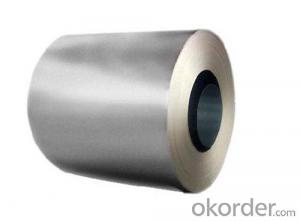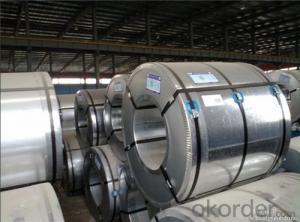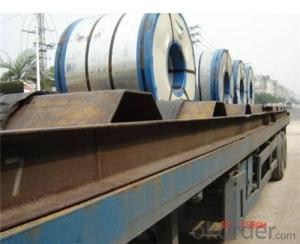Cold Rolled Galvanized Steel Coil for Building
- Loading Port:
- Shanghai
- Payment Terms:
- TT OR LC
- Min Order Qty:
- 36 m.t.
- Supply Capability:
- 30000 m.t./month
OKorder Service Pledge
Quality Product, Order Online Tracking, Timely Delivery
OKorder Financial Service
Credit Rating, Credit Services, Credit Purchasing
You Might Also Like
Product Description of Cold Rolled Galvanized Steel Coil/Plate
| Standard | ASTM,GB,JIS |
| Grade | DX51D+Z,SGCC |
| Thickness | 0.18-1.5MM |
| Width | 914,1000,1219,1250MM |
| Coil weight | 3-6mts |
| Top paint | 20MIL |
| Back paint | 7MIL |
| Surface treatment | color coated/galvanized/galvalume |
| Delivery time | 7-20 working days |
| Packing : | waterproof paper, galvanized steel covered and steel strip packed |
| USeage | widely used in construction,home,appliance,decoration,wear resistant steel,etc |
FAQ
Payment
30% deposit, 70% by T/T against B/L copy; or by L/C at sight
Guarantee against colour fading.
These products can be customized according to your requirement, including zinc coating,
printing color, roll width, etc.
1. Minimum Order Quantity?
MOQ is 25 tons, your quantity is ok, sample is available.
2. What kind of terms of payment?
T/T, L/C,are available.
- Q:What are the common defects found in uncoiled steel coils?
- Some common defects found in uncoiled steel coils include edge waves, center buckles, coil breaks, surface defects such as scratches or dents, and variations in thickness or width.
- Q:What are the common defects in steel coil finishes?
- Steel coil finishes can be affected by various defects that can impact both their appearance and functionality. Before using or selling the coil, these defects may need to be addressed. One common defect is coil breaks, where the steel strip breaks during winding or unwinding. If not dealt with, this defect can cause a discontinuity in the coil's surface and potentially lead to further damage. Another defect is edge wave, which refers to a distortion or waviness at the edges of the coil. This can occur during the rolling or cooling process and can affect the coil's flatness and uniformity. Corrosion is another issue that can arise if steel coils are not properly protected or stored. This can result in rust and degradation of the steel, impacting its strength and appearance. Streaks and stains can appear on the surface of steel coils due to improper cleaning or contamination during production. These defects can affect the aesthetic appearance of the steel and may need to be addressed before use. Scratches and dents can occur during handling, transportation, or storage of steel coils. These defects can impact the flatness and surface quality of the steel and may require repairs or adjustments. If a coating or paint is applied to the steel coil, several defects can arise, including blistering, peeling, or uneven application. These coating defects can affect the durability and appearance of the steel. It's important to note that the severity of these defects can vary, and different methods of repair or mitigation may be needed. Regular inspections and quality control measures can help to identify and address these defects before they become more significant issues.
- Q:Can steel coils be coated with anti-slip materials?
- Yes, steel coils can be coated with anti-slip materials.
- Q:What are the common problems faced during steel coil production?
- Some common problems faced during steel coil production include surface defects such as scratches or dents, dimensional inconsistencies, coil breakage, edge wave formation, and coil slitting issues. Other challenges may include coil corrosion, improper coil cooling, and quality control issues.
- Q:I live in Dubai. I want to make a damascus steel sword and have no idea where to get the steel or what sort of steel I should get.First to adress the access of my steel...I need to get some low carbon and high carbon steel for the Damascus....what sort of steel is recommended for this? Also where would I be able to get my hands on it (Internet options e.g websites or locations)THANKS
- hI Jordan damascus steel is not actually a steel it is a composite material like the damascus rifle barrels the Afghan's use it is made from wire wrapped around an inner mandrel the beaten on an anvil till all the wire becomes one so it is several types of iron and steel beaten together and forged to produce it so it is not something you can actually buy as a material the tribesmen that produce these swords have these secret methods of doing this so there is the first problem. it is not like cast steel which is what most swords are made of it is far more complex in it's construction. so you may need to do a lot of research to find out how. what is a similar idea is the SAMURAI sword that is made up of combining different steels together and forged into a very sharp and capable killing blade.
- Q:What are the factors affecting the strength of steel coils?
- There are several factors that can affect the strength of steel coils. 1. Steel Grade: The type and quality of the steel used in the coils plays a significant role in determining their strength. Different steel grades have varying levels of carbon content, alloying elements, and heat treatment processes, which can impact the overall strength and durability of the coils. 2. Manufacturing Process: The way in which the steel coils are manufactured can also affect their strength. Factors such as the temperature and duration of the heat treatment, the rolling and annealing processes, and the level of cold working can all influence the final strength of the coils. 3. Thickness and Width: The thickness and width of the steel coils can affect their strength. Thicker coils tend to be stronger and more resistant to deformation, while wider coils may exhibit variations in strength across their surface. 4. Surface Quality: The condition of the coil's surface, including any imperfections or defects, can influence its strength. Surface defects such as scratches, pits, or corrosion can act as stress concentration points, reducing the overall strength of the coil. 5. Storage and Handling: The way in which the coils are stored and handled can impact their strength. Factors such as exposure to moisture, extreme temperatures, or improper stacking and transportation can lead to deformation or damage, decreasing the strength of the coils. 6. Environmental Conditions: Environmental factors such as humidity, temperature, and exposure to corrosive agents can also affect the strength of steel coils. In harsh environments, the coils may experience accelerated corrosion, leading to a decrease in their strength over time. It is important to consider these factors when selecting and utilizing steel coils to ensure that they meet the required strength specifications for the intended application.
- Q:What are the benefits of using coated steel coils in roofing applications?
- There are several benefits of using coated steel coils in roofing applications. Firstly, coated steel coils offer exceptional durability and resistance to corrosion, making them highly suitable for outdoor use. This helps to prolong the lifespan of the roofing system and reduce maintenance costs. Additionally, the coatings provide excellent weather resistance, protecting the roof from harsh elements such as UV rays, rain, snow, and hail. Coated steel coils also offer a wide range of colors and finishes, allowing for greater design flexibility and aesthetic appeal. Furthermore, these coils are lightweight, which facilitates easier installation and reduces the overall weight load on the structure. Overall, using coated steel coils in roofing applications ensures long-lasting protection, enhanced aesthetics, and reduced maintenance requirements.
- Q:I'm looking to buy the Milano Stiletto, and it uses 1045 steel. I was just wondering whether this will hold up and keep an edge.
- Unfortunately, okorder /
- Q:How are steel coils inspected for coil set?
- Steel coils are inspected for coil set by uncoiling a portion of the coil and measuring the amount of curvature or shape deviation. This is done using specialized equipment and techniques to accurately assess and quantify the coil set present in the steel coils.
- Q:for instance Cr-Ni steeldoes this refer to plated steel or a uniform mixture
- stainless steel is an alloy normally iron with additions of C, Mn, Ni, Cr, and Nb - amounts added depend on properties required. Corrosion resistance is due to a very thin but dense layer of chromium oxide which forms at the surface and prevents further attack. Ordinary steel on the other hand becomes coated with a porous layer of iron oxide(rust) through which the atmosphere can pass and cause further corrosion.
1. Manufacturer Overview |
|
|---|---|
| Location | |
| Year Established | |
| Annual Output Value | |
| Main Markets | |
| Company Certifications | |
2. Manufacturer Certificates |
|
|---|---|
| a) Certification Name | |
| Range | |
| Reference | |
| Validity Period | |
3. Manufacturer Capability |
|
|---|---|
| a)Trade Capacity | |
| Nearest Port | |
| Export Percentage | |
| No.of Employees in Trade Department | |
| Language Spoken: | |
| b)Factory Information | |
| Factory Size: | |
| No. of Production Lines | |
| Contract Manufacturing | |
| Product Price Range | |
Send your message to us
Cold Rolled Galvanized Steel Coil for Building
- Loading Port:
- Shanghai
- Payment Terms:
- TT OR LC
- Min Order Qty:
- 36 m.t.
- Supply Capability:
- 30000 m.t./month
OKorder Service Pledge
Quality Product, Order Online Tracking, Timely Delivery
OKorder Financial Service
Credit Rating, Credit Services, Credit Purchasing
Similar products
New products
Hot products
Related keywords





























